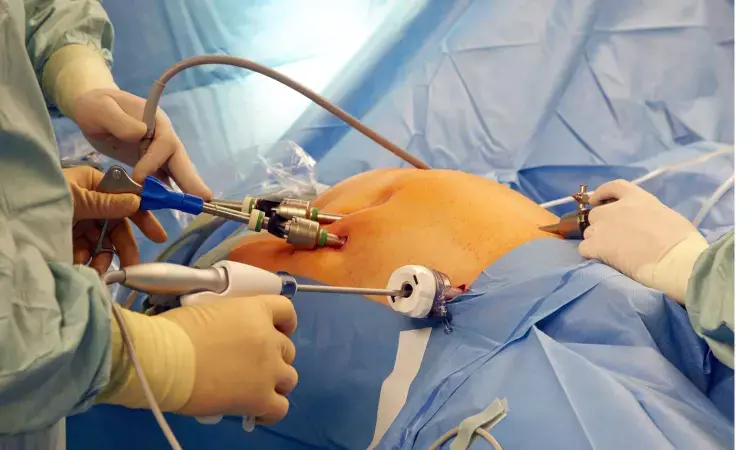- Home
- Medical news & Guidelines
- Anesthesiology
- Cardiology and CTVS
- Critical Care
- Dentistry
- Dermatology
- Diabetes and Endocrinology
- ENT
- Gastroenterology
- Medicine
- Nephrology
- Neurology
- Obstretics-Gynaecology
- Oncology
- Ophthalmology
- Orthopaedics
- Pediatrics-Neonatology
- Psychiatry
- Pulmonology
- Radiology
- Surgery
- Urology
- Laboratory Medicine
- Diet
- Nursing
- Paramedical
- Physiotherapy
- Health news
- Fact Check
- Bone Health Fact Check
- Brain Health Fact Check
- Cancer Related Fact Check
- Child Care Fact Check
- Dental and oral health fact check
- Diabetes and metabolic health fact check
- Diet and Nutrition Fact Check
- Eye and ENT Care Fact Check
- Fitness fact check
- Gut health fact check
- Heart health fact check
- Kidney health fact check
- Medical education fact check
- Men's health fact check
- Respiratory fact check
- Skin and hair care fact check
- Vaccine and Immunization fact check
- Women's health fact check
- AYUSH
- State News
- Andaman and Nicobar Islands
- Andhra Pradesh
- Arunachal Pradesh
- Assam
- Bihar
- Chandigarh
- Chattisgarh
- Dadra and Nagar Haveli
- Daman and Diu
- Delhi
- Goa
- Gujarat
- Haryana
- Himachal Pradesh
- Jammu & Kashmir
- Jharkhand
- Karnataka
- Kerala
- Ladakh
- Lakshadweep
- Madhya Pradesh
- Maharashtra
- Manipur
- Meghalaya
- Mizoram
- Nagaland
- Odisha
- Puducherry
- Punjab
- Rajasthan
- Sikkim
- Tamil Nadu
- Telangana
- Tripura
- Uttar Pradesh
- Uttrakhand
- West Bengal
- Medical Education
- Industry
New studies suggest benefit of total robotic metabolic and bariatric surgery over conventional laparoscopy

Two new studies presented today at the American Society for Metabolic and Bariatric Surgery (ASMBS) 2024 Annual Scientific Meeting suggest total robotic metabolic and bariatric surgery may result in shorter operative times, reduced lengths of stay and lower complications compared to laparoscopic approaches.
In one study, researchers from AdventHealth in Celebration, FL examined the outcomes of a single surgeon who performed 809 metabolic and bariatric operations – 498 totally robotic and 311 laparoscopic -- between 2020 and 2023. They found total robotic Roux-en-Y gastric bypass (RYGB) resulted in significantly shorter operative times (97.6 min. vs. 115.4 min), reduced hospitalization (1.19 days vs. 1.39 days), and lower complication rates (1.7% vs. 5.1%) compared to conventional laparoscopy.
Total robotic sleeve gastrectomy procedures produced similar benefits -- less operative time (47.4 min. vs. 53.1 min.), shorter length of stay (1.14 days vs. 1.30 days), and fewer complications (0.8% vs. 3.2%). The surgical approach to a duodenal switch did not influence operative times and complication rates but the total robotic approach did result in shorter lengths of stay.
This study comes after recent meta-analyses and registry reports found metabolic and bariatric surgery performed robotically had similar outcomes to conventional laparoscopy but with longer operative times and higher costs. The researchers note, however, that most of the robotic surgeries in these reports were robot-assisted rather than totally robotic.
In a second study, these same researchers report improved outcomes and efficiencies for robotic procedures involving patients, this time with severe obesity and type 2 diabetes. A total of 744 patients received either totally robotic (n= 469) or laparoscopic RYGB or sleeve gastrectomy (n=275). Major complication rates for patients with diabetes (2.4% vs. 8.3%), length of stay (1.19 days vs. 1.48 days) and operative times (71.7 min. vs. 90.5 min.) were all lower compared to laparoscopy and were comparable to rates seen with patients with no diabetes. The average preoperative BMI was 46.1.
“The robotic platform has advantages for patients with diabetes and high surgical risk,” said study co-author on both studies, Cynthia Buffington, PhD, researcher at AdventHealth. “Surgeons may achieve a higher level of precision, flexibility and control than is possible with conventional laparoscopy. This results in less tissue trauma, shorter recovery times, less opportunity for scarring, milder postoperative pain, and lower risk for infections and bleeds.”
The ASMBS reports that in 2022 nearly 280,000 metabolic and bariatric procedures were performed in the U.S., which represents only about 1% of those who meet eligibility requirements based on BMI. While the ASMBS does not track the number of robotic surgeries performed each year, these types of procedures are on the rise.
“Total robotic surgery is playing an increasing role in metabolic and bariatric surgery bringing new efficiencies and fewer complications for certain procedures and patients,” said Ann Rogers, MD, ASMBS President-elect and Director, Penn State Surgical Weight Loss Program, Penn State Health, Hershey, PA, who was not involved in the study.
According to the U.S. Centers for Disease Control and Prevention (CDC), obesity effects 42.4% of Americans. Studies show the disease can weaken or impair the body’s immune system and cause chronic inflammation and increase the risk of many other diseases and conditions including cardiovascular disease, stroke, type 2 diabetes, and certain cancers.
Dr Kamal Kant Kohli-MBBS, DTCD- a chest specialist with more than 30 years of practice and a flair for writing clinical articles, Dr Kamal Kant Kohli joined Medical Dialogues as a Chief Editor of Medical News. Besides writing articles, as an editor, he proofreads and verifies all the medical content published on Medical Dialogues including those coming from journals, studies,medical conferences,guidelines etc. Email: drkohli@medicaldialogues.in. Contact no. 011-43720751


